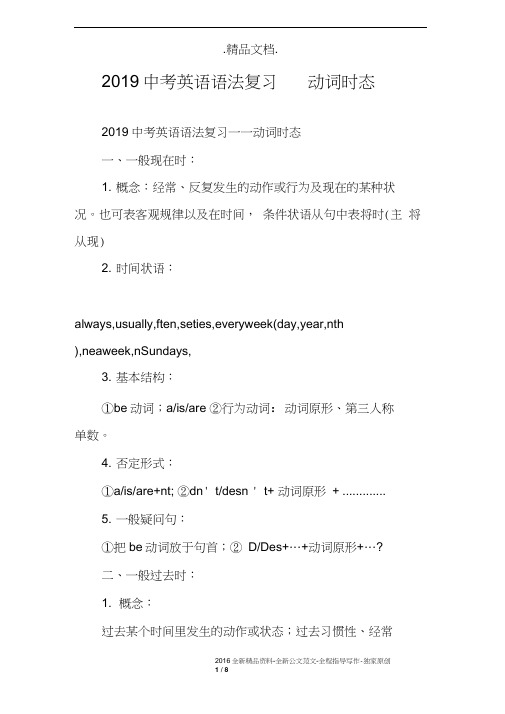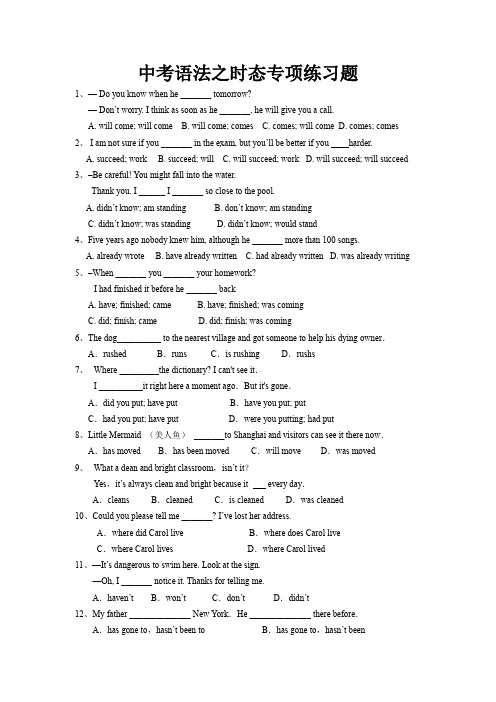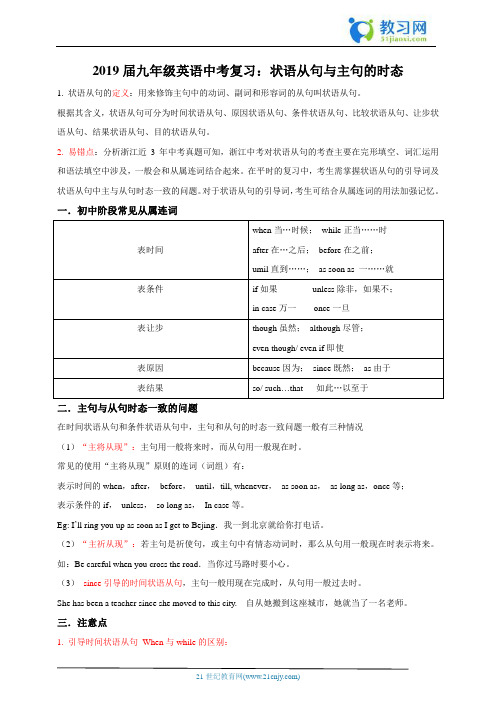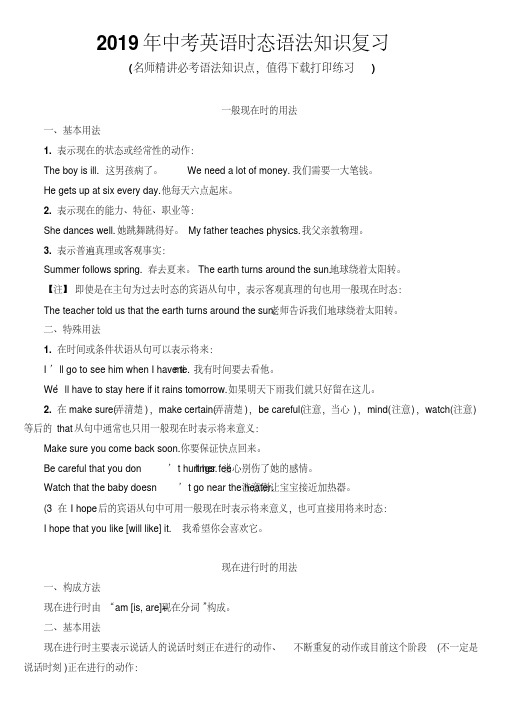2019中考英语复习--时态专项复习
2019年中考英语语法专题复习三

2019年中考英语语法专题复习(三)动词的时态中考时态考查的热点为课标要求初中考生掌握的六种时态:一般现在时、一般过去时、一般将来时、现在进行时、过去进行时、现在完成时。
(2)考试主要考查过去完成时、现在完成进行时和过去将来时及初中常考时态的特殊用法,如状语从句中用一般现在时表示将来,体现初高中英语的衔接。
一.一般现在时的用法一般现在时除了可以表示现在的经常性、习惯性动作或状态外,还可以表示:(1)一般现在时表示客观真理、科学事实及自然现象。
此用法即使出现在过去语境中,也用一般现在时。
如:The sun rises in the east.太阳从东方升起。
The teacher told us that the wa-ter boils at 100℃.老师告诉我们水在摄氏100度沸腾。
(2)用于here,there开头的倒装句中,一般现在时表示现在正在发生的动作或存在的状态。
如:There goes the bell.铃响了。
Here comes the bus.公共汽车来了。
核心题根1 (1)一Is your mother a teacher?—Yes, she is. She at a junior high school.A. taughtB. teachesC. will teachD. is teaching思路点拨:此题关注的是母亲现在的工作情况,故用一般现在时,又主语为单数第三人称,动词应为单数第三人称形式。
(2)“Life is like walking in the snow,”Granny used to say,“because every step .”A. has shownB. is showingC. showsD. showed思路点拨:扔奶过去常说:“生活就好像在雪中行走,每一步都要留下足迹。
”引号中是说话当时的情景,可以不用过去时,根据说话的需要该用什么时态就用什么时态。
2019中考英语语法复习——动词时态

.精品文档.2019中考英语语法复习动词时态2019中考英语语法复习一一动词时态一、一般现在时:1. 概念:经常、反复发生的动作或行为及现在的某种状况。
也可表客观规律以及在时间,条件状语从句中表将时(主将从现)2. 时间状语:always,usually,ften,seties,everyweek(day,year,nth),neaweek,nSundays,3. 基本结构:①be动词;a/is/are ②行为动词:动词原形、第三人称单数。
4. 否定形式:①a/is/are+nt; ②dn' t/desn ' t+ 动词原形+ .............5. 一般疑问句:①把be动词放于句首;② D/Des+…+动词原形+…?二、一般过去时:1. 概念:过去某个时间里发生的动作或状态;过去习惯性、经常性的动作、行为2. 时间状语:ag,yesterday,thedaybefreyesterday,lastweek(year,night,nth …),in1989,ustnw,attheagef5,neday,lnglngag,ne upnatie,thisrning3. 基本结构:① be 动词;was/were …②行为动词:动词的过去式4. 否定形式:①was/were+nt;②didn ' t+ 动词原形5. 一般疑问句:①was或were放于句首;②Did+…+动词原形…三、现在进行时:1. 概念:表示现阶段或说话时正在进行的动作及行为。
2. 时间状语:nw,atthistie,thesedays,lk,listen,anyusee?an tyusee?之类的暗示语。
3. 基本结构:a/is/are+ding4. 否定形式:a/is/are+nt+ding.5. 一般疑问句:Is/Are …+dingsth?四、过去进行时:2016全新精品资料-全新公文范文-全程指导写作-独家原创2 / 81. 概念:表示过去某段时间或某一时刻正在发生或进行的行为或动作。
2019年中考英语必考时态语法

一般现在时1. 概念:经常、反复发生的动作或行为及现在的某种状况。
2. 基本结构:①is/am/are;②do/does否定形式:①am/is/are+not;②此时态的谓语动词若为行为动词,则在其前加don't,如主语为第三人称单数,则用doesn't,同时还原行为动词。
3. 一般疑问句:①把is/am/are动词放于句首;②用助动词do提问,如主语为第三人称单数,则用does,同时,还原行为动词。
4. 用法1) 经常性或习惯性的动作,常与表示频度的时间状语连用。
例如:I leave home for school at 7 every morning. 每天早上我七点离开家。
2) 客观真理,客观存在,科学事实。
例如:The earth moves around the sun. 地球绕太阳转动。
Shanghai lies in the east ofChina. 上海位于中国东部。
3) 表示格言或警句。
例如:Pride goes before a fall. 骄者必败。
注意:此用法如果出现在宾语从句中,即使主句是过去时,从句谓语也要用一般现在时。
例如:Columbus proved that the earth is round. 哥伦布证实了地球是圆的。
4) 现在时刻的状态、能力、性格、个性。
例如:I don't want so much. 我不要那么多。
Ann writes good English but does not speak well.安英语写得不错,讲的可不行。
5) 一般现在时表示将来含义a. 下列动词come, go, arrive, leave, start, begin, return的一般现在时可以表示将来,主要用来表示在时间上已确定或安排好的事情。
例如:The train leaves at six tomorrow morning. 火车明天上午六点开。
2019中考英语必考八大时态总结

2019中考英语必考八大时态总结在初中阶段,我们学习到的常用的时态有8种:一般现在时,一般过去时,现在进行时,过去进行时,现在完成时,过去完成时,一般将来时和过去将来时。
一下将对初中阶段英语时态知识要点、考点进行归纳总结,希望能对大家复习备考与解题有所帮助。
.1 一般现在时的用法1) 经常性或习惯性的动作,常与表示频度的时间状语连用。
时间状语:every…,sometimes,ofen,always,usually, twice a week, at…, on SundayI leave home for school at 7 every morning. He watches Tv once a week .2) 客观真理,客观存在,科学事实。
The earth moves around the sun. Shanghai lies in the east of China.3) 表示格言或警句中。
Pride goes before a fall. 骄者必败。
注意:此用法如果出现在宾语从句中,即使主句是过去时,从句谓语也要用一般现在时。
例:Columbus proved that the earth is round..4) 现在时刻的状态、能力、性格、个性。
I don't want so much. Ann Wang writes good English but does not speak well.比较:Now I put the sugar in the cup. I am doing my homework now.第一句用一般现在时,用于操作演示或指导说明的示范性动作,表示言行的瞬间动作。
再如:Now watch me, I switch on the current and stand back. 第二句中的now是进行时的标志,表示正在进行的动作的客观状况,所以后句用一般现在时。
2019年云南中考英语总复习时态

中考语法之时态专项练习题1、— Do you know when he _______ tomorrow?—Don’t worry. I think as soon as he _______, he will give you a call.A. will come; will comeB. will come; comesC. comes; will comeD. comes; comes2、 I am not sure if you _______ in the exam, but you’ll be better if you harder.A. succeed; workB. succeed; willC. will succeed; workD. will succeed; will succeed3、–Be careful! You might fall into the water.--Thank you. I ______ I _______ so close to the pool.A. did n’t know; am standingB. don’t know; am standingC. didn’t know; was standingD. didn’t know; would stand4、Five years ago nobody knew him, although he _______ more than 100 songs.A. already wroteB. have already writtenC. had already writtenD. was already writing5、–When _______ you _______ your homework?--I had finished it before he _______ backA. have; finished; cameB. have; finished; was comingC. did; finish; cameD. did; finish; was coming6、The dog__________ to the nearest village and got someone to help his dying owner.A.rushed B.runs C.is rushing D.rushs7、--Where _________the dictionary? I can't see it.--I __________it right here a moment ago.But it's gone.A.did you put; have put B.have you put; putC.had you put; have put D.were you putting; had put8、Little Mermaid (美人鱼)_______to Shanghai and visitors can see it there now.A.has moved B.has been moved C.will move D.was moved9、--What a dean and bright classroom,isn’t it?--Yes,it’s always clean and bright because it every day.A.cleans B.cleaned C.is cleaned D.was cleaned10、Could you please tell me _______? I’ve lost her address.A.where did Carol live B.where does Carol liveC.where Carol lives D.where Carol lived11、—It’s dangerous to swim here. Look at the sign.—Oh, I _______ notice it. Thanks for telling me.A.haven’t B.won’t C.don’t D.didn’t12、My father ______________ New York.He ______________ there before.A.has gone to,hasn’t been to B.has gone to,hasn’t beenC.has been to,hasn’t gone D.has been to,hasn’t gone to13、The children _________ to swim last month.A.are taught B.were taught C.have taught D.taught14、It is not an easy task to choose a personal computer, for technology ________ rapidly.A.is changing B.has changed C.changed D.will changed15、Tom ________ a letter from Terry for a long time.A.didn’t receive B.hasn’t got C.didn’t have D.hasn’t heard16、She ______ the computer for eight years, and it is still in good condition now.A. has hadB. has boughtC. will waitD. has borrowed17、--- I called you yesterday afternoon, but there was no reply.---I ______ a dolphin show in the zoo with my cousins.A.watched B.will watch C.am watching D.was watching18、When does Oxfam Trailwalker ____every year? It ______in November every year since 1981.A. hold, take placeB. talk place, is heldC. take place, has been heldD. held, has taken place19、Tom wasn't at home yesterday. He _________ to help with Jenny's physics.A.was asking B.is asked C.was asked D.was asking20、While the boy down the street, the UFO landed.A.had walked B.was walking C.has walked D.is walking21、--Do you know ________ the MP4 player last Sunday? --Sorry,I have no idea,A.How much did She pay for B.How much she paid for C.How much had she paid for 22、Tom and Jim ________ friends since they met each other for the first time five years ago.A.were B.have become C.have made D.have been 23、—Where are the Greens, may I ask?—Well, they ______ to England. They have been there for nearly a week now.A.have been B.are going to C.have gone D.will go24、—Did you watch the football match yesterday?—Yes,I did.You know,my brother_______ in the match.A.is playing B.was playing C.has played D.will play25、--Is Bohai Bridge open to the public yet?--Yes.It ________ for almost one and half months.A.has opened B.has being opened C.has been open D.was open 26、Personal computers in 1976.It has changed the whole world.A.are invented B.invented C.were invented D.have been invented 27、-- I knocked into a tree when I went to the station to meet my friend.-- I suppose you too fast.A. driveB. are drivingC. have drivenD. were driving28、By the time I got up, my mother ________ the breakfast well.A. has cookedB. cookedC. have cookedD. had cooked29、She often to school early, but this morning she to school late.A. go ; wentB. goes; goesC. goes ; wentD. went; goes30、--Would you like to visit Shantou City with me this summer vacation?--No, thanks. I it before. Besides, it's hot and humid there in summer.A. have visitedB. visitedC. will visit31、--Where were your parents at 7:00 last Monday evening?--They ____. But I was not at home.A. watched TVB. were watching TVC. are watching TVD. watching TV32、---Hi,Joan.I haven’t seen you for weeks.What __________ recently?---Carrying on some research on wildlife.A.have you been doing B.have you done C.Were doing D.did you do 33、—I knocked into a tree when I went to the railway station for my friend.—I suppose you _____ too fast.A. driveB. are drivingC. have drivenD. were driving34、–Have you seen Mr. Black these days, Jack?--Yes, I met him when I ________ in the street yesterday.A. walkedB. was walkingC. have walkedD. is walking35、The manager ____ nothing about the matter ____ he read his secretary’s report.A. had known, whenB. has known, beforeC. will know, afterD. knew, until36、He insisted ____ he was telling the truth, but it seemed nobody ____ him.A. that, would believeB. why, had believedC. how, could believeD. whether, believed37、—Hi: I ______ you for a long time.— ______ in Beijing.I’ve just come back.A.hadn’t seen: am B.didn’t see;will be C.haven’t seen; was38、Jack ________ his math test.He said that he would fail it.A.worry about B.was worried about C.is worried about39、—I’m sorry I my homework at home.—That’s all right.Don’t forget it to school his afternoon.A.forget;to bring B.left; to take C.left;to bring40、We basketball on the playground when it to rain.A.played, began B.were playing, began C.played, was beginning参考答案1、B2、C3、C4、C5、C6、A7、B8、B9、C10、C11、D12、B13、B14、A 15、B16、A17、D18、C19、C20、B21、B22、D23、C24、B25、C26、C27、D28、D29、C30、A31、B32、A33、D34、B35、D36、A37、C38、B39、C40、B。
山东省潍坊市2019年中考英语总复习语法专项复习语法十一动词的时态及语态课

He will visit Scotland next week.他下周要去苏格兰旅游。 I am going to stay for a week.我打算待一个星期。 Look at the dark clouds. It is going to rain.看那乌云,要下 雨了。 ★be going to do表示将来时,指事先经过考虑的打算或有 迹象表明要发生某事。
7
5.过去进行时 由“was/were+现在分词”构成,表示过去某一时间正在发 生的事情或过去某段时间一直在做的事情。常与this time yesterday, “when+过去动作”等时间状语连用。 She was watching TV at this time yesterday.昨天这个时候 她正在看电视。 They were waiting for you last night.昨晚他们一直在等你。
12
3.一般将来时的被动语态(will/shall be done)
I think the desks will be repaired soon.我想这些课桌很快
要被修好了。
4.含情态动词的被动语态(can/may/must/should be done)
Where can the lost book be found?这本丢失的书能在哪
9
★当句中有“How long...?/since.../for...”等时间状语时,句 中动词要用延续性动词。非延续性动词与延续性动词的转 换如下: buy→have borrow→keep leave→be away die→be dead become→be come to→be in begin→be on stop→be over
2019届九年级英语中考复习:状语从句与主句的时态

2019届九年级英语中考复习:状语从句与主句的时态1. 状语从句的定义:用来修饰主句中的动词、副词和形容词的从句叫状语从句。
根据其含义,状语从句可分为时间状语从句、原因状语从句、条件状语从句、比较状语从句、让步状语从句、结果状语从句、目的状语从句。
2. 易错点:分析浙江近3年中考真题可知,浙江中考对状语从句的考查主要在完形填空、词汇运用和语法填空中涉及,一般会和从属连词结合起来。
在平时的复习中,考生需掌握状语从句的引导词及状语从句中主与从句时态一致的问题。
对于状语从句的引导词,考生可结合从属连词的用法加强记忆。
一.初中阶段常见从属连词二.主句与从句时态一致的问题在时间状语从句和条件状语从句中,主句和从句的时态一致问题一般有三种情况(1)“主将从现”:主句用一般将来时,而从句用一般现在时。
常见的使用“主将从现”原则的连词(词组)有:表示时间的when,after,before,until,till, whenever,as soon as,as long as,once等;表示条件的if,unless,so long as,In case等。
Eg: I’ll ring you up as soon as I get to Bejing.我一到北京就给你打电话。
(2)“主祈从现”:若主句是祈使句,或主句中有情态动词时,那么从句用一般现在时表示将来。
如:Be careful when you cross the road.当你过马路时要小心。
(3)since引导的时间状语从句,主句一般用现在完成时,从句用一般过去时。
She has been a teacher since she moved to this city. 自从她搬到这座城市,她就当了一名老师。
三.注意点1. 引导时间状语从句When与while的区别:When 当……时候从句用一般过去时,主句用过去进行时。
While 正当……时引导的从向中,谓语动词必须是延续性动词,且常常用进行时。
2019年中考英语时态语法知识复习

2019年中考英语时态语法知识复习(名师精讲必考语法知识点,值得下载打印练习)一般现在时的用法一、基本用法1.表示现在的状态或经常性的动作:The boy is ill. 这男孩病了。
We need a lot of money. 我们需要一大笔钱。
He gets up at six every day. 他每天六点起床。
2.表示现在的能力、特征、职业等:She dances well. 她跳舞跳得好。
My father teaches physics. 我父亲教物理。
3.表示普遍真理或客观事实:Summer follows spring. 春去夏来。
The earth turns around the sun. 地球绕着太阳转。
【注】即使是在主句为过去时态的宾语从句中,表示客观真理的句也用一般现在时态:The teacher told us that the earth turns around the sun. 老师告诉我们地球绕着太阳转。
二、特殊用法1.在时间或条件状语从句可以表示将来:me. 我有时间要去看他。
I’ll go to see him when I have tiWe’ll have to stay here if it rains tomorrow. 如果明天下雨我们就只好留在这儿。
2.在make sure(弄清楚),make certain(弄清楚),be careful(注意,当心),mind(注意),watch(注意)等后的that从句中通常也只用一般现在时表示将来意义:Make sure you come back soon. 你要保证快点回来。
lings. 当心别伤了她的感情。
Be careful that you don’t hurt her fee注意别让宝宝接近加热器。
Watch that the baby doesn’t go near the heater.(3 在I hope后的宾语从句中可用一般现在时表示将来意义,也可直接用将来时态:I hope that you like [will like] it. 我希望你会喜欢它。
- 1、下载文档前请自行甄别文档内容的完整性,平台不提供额外的编辑、内容补充、找答案等附加服务。
- 2、"仅部分预览"的文档,不可在线预览部分如存在完整性等问题,可反馈申请退款(可完整预览的文档不适用该条件!)。
- 3、如文档侵犯您的权益,请联系客服反馈,我们会尽快为您处理(人工客服工作时间:9:00-18:30)。
2 They asked the teacher a question.(改为否定句) They didn’t ask the teacher a question. 3 Tom watched TV for two hours.(对画线部分提问) How long did Tom watchTV?
主语是第三人称单数时,谓语动词形式有变化,一般在动词末尾加
s,否定句在行为动词前加doesn’t, 一般疑问句在句前加does
动词三单的变化: 1、一般动词后加s,如:reads,plays,works,makes 2、以 s,x,ch,sh, 结尾,后加es. 如:watches, 3、以辅音字母加o结尾,一般加es ,如:does,goes 4、辅音字母+y结尾的单词,去y,加ies,如:worries
例如: 1、我们经常8点上学。 We often go to school at 8.
2、每天下课后我们打扫教室。 We clean the classroom after class every day. 3、有时我们在操场上踢足球 。 We sometimes play football on the playground. 4、Mary一周在学校吃三次午饭。
一般过去时:Simple Past Tense
定义: 一般现在时:1、表达过去发生的动作。 2、表示过去存在的状态。 标志词:
yesterday(昨天) yesterday morning(昨天早上) last night(昨天晚上) last week(上周) two days ago(两天前) a week ago(一周前) in 1990, (在1990年) just now (刚才)
We had dinner at school just now. 5、他两年前学英语。 He learned English two years ago.
变化规则 一般在词尾加—ed
例词 play→played
以不发音的e结尾的,只 like →liked
加--d
love →loved
以辅音字母+y 结尾的, study →studied
4. She _______(help) me do some cleaning yesterday. 5. Did you (go) to the library just now?
6. I _____ (buy) a new bike last weekend.
变y为i ,再加—ed
carry →carried
以一个辅音字母结尾的 重读闭音节,先双写这 个辅音字母,再加-ed
stop →stopped plan →planned
只有实义动词的一般过去时,其否定句一般是 在谓语动词前 didn’t,一般疑问句在句前加did,且 句中的动词过去式要还原。
Exercise
stu称单数时,要加 “s”
1) work -> works 2) 辅音字母和“y”结尾的词,如carry -> carries 3) 以s、x、ch、sh结尾的加“es”,如wash ->
washes
4) go -> goes
5) do -> does
6) have -> has 7) be 的一般现在时是am is are
Exercise 1. I get up at six o’clock every day.
_____ ____ you get up every day? 2. They usually go to the park on Sunday.
_____ _____ they usually ____ on Sunday? 3. Lucy goes to school at 8 every day.(一般疑问句)
every day(每天) every week(每周)
every month(每月) every term(每学期)
every year(每年) once a week (一周一次)
一般现在时用法:
1.表示现在的状态: e.g. He’s twelve.
She’s at work. 2.表经常或习惯性的动作: e.g. I get up at 6:30 every day.
He reads English every morning. 3.表主语具备的性格和能力等: e.g. She likes noodles.
They speak French. 4.普遍真理和自然规律: e.g. Two plus four is six.
The moon goes around the earth.
时
态
定义:
在英语中,不同时间发生的
动作要用不同的动词形式来表示,这每一种不 同的形式就叫做时态。
一般现在时:Simple Present Tense
定义:
一般现在时:1、表达经常性或习惯性的动作。 2、表示现在的状态。
标志词:
often(经常)
sometimes(有时)
always(总是)
usually(通常)
Mary eats lunch three times a week at school. 5、他喜欢英语。 He likes English. 6、他是一个学生。
He is a student.
Do you know?
第一人称和第二人称的一般现在时,其谓语动词没有形式的变化,
其否定形式一般是在谓语动词前 don’t,一般疑问句在句前加do
_____ Lucy ____ to school at 8 every day? 4. Mary _____ (go) to school at 8 every day. 5. My mother ______(clean) the room once a day. 6. He ______ (not clean) the room every weekends.
例如: 1、我们昨天去上学。 We went to school yesterday.
2、昨天下午课后我们打扫教室。 We cleaned the classroom after class last afternoon.
3、上周我们在操场上踢足球 。 We played football on the playground last week. 4、我们刚才在学校吃晚饭。
